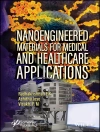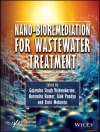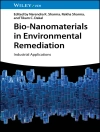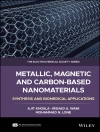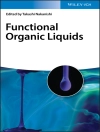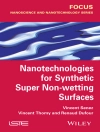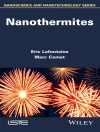Endohedral Metallofullerenes: Fullerenes with Metal Inside presents a comprehensive survey of the current state of knowledge on endohedral metallofullerenes, from preparation to functionalization, reactivity and applications. Following a brief historical overview, the book describes methods for synthesis, extraction, separation and purification, and provides an insight into the molecular and crystal structures. Subsequent chapters discuss various categories of endohedral metallofullerenes based on the encapsulated species, including carbides, nitrides, sulphides, oxides, non-metal and non-IPR endohedral metallofullerenes, followed by scanning tunneling microscopy studies and the examination of electronic, vibrational, magnetic and optical properties. The book concludes with chapters addressing the chemical functionalization of endohedral metallofullerenes, and applications ranging from solar cells to biomedicine.
विषयसूची
Foreword ix
Preface xi
Personal Reflection – Nori Shinohara xiii
1 Introduction 1
1.1 The First Experimental Evidence of Metallofullerenes 1
1.2 Early Years of Metallofullerene Research 3
1.3 Conventional and IUPAC Nomenclature for Metallofullerenes 5
References 6
2 Synthesis, Extraction, and Purification 9
2.1 Synthesis of Endohedral Metallofullerenes 9
2.2 Solvent Extraction of Metallofullerenes from Primary Soot 14
2.3 Purification and Isolation by HPLC 15
2.4 Fast Separation and Purification with Lewis Acids 18
References 19
3 Molecular and Crystal Structures 23
3.1 Endohedral or Exohedral? A Big Controversy 23
3.2 Structural Analyses 25
References 37
4 Electronic States and Structures 43
4.1 Electron Transfer in Metallofullerenes 43
4.2 ESR Evidence on the Existence of Structural Isomers 45
4.3 Electrochemistry of Metallofullerenes 48
4.4 Similarity in the UV?]Vis?]NIR Absorption Spectra 51
4.5 Fermi Levels and the Electronic Structures 57
4.6 Metal-Cage Vibration within Metallofullerenes 59
References 63
5 Carbide and Nitride Metallofullerenes 69
5.1 Discovery of Carbide Metallofullerenes 69
5.2 Fullerene Quantum Gyroscope: An Ideal Molecular Rotor 75
5.3 Nitride Metallofullerenes 77
References 81
6 Non?]Isolated Pentagon Rule Metallofullerenes 85
6.1 Isolated Pentagon Rule 85
6.2 Non?]IPR Metallofullerenes 86
References 89
7 Oxide and Sulfide Metallofullerenes 91
7.1 O xide Metallofullerenes 91
7.2 Sulfide Metallofullerenes 95
References 100
8 Non?]metal Endohedral Fullerenes 103
8.1 Nitrogen?]Containing N@C60 103
8.2 Phosphorus?]Containing P@C60 111
8.3 Inert Gas Endohedral Fullerenes He@C60, Ne@C60, Ar@C60, Kr@C60, and Xe@C60 112
8.4 Hydrogen?]Containing H2@C60 120
8.5 Water?]Containing H2O@C60 125
References 128
9 Scanning Tunneling Microscopy Studies of Metallofullerenes 133
9.1 STM Studies of Metallofullerenes on Clean Surfaces 133
9.2 Metallofullerenes as Superatom 135
9.3 STM/STS Studies on Metallofullerene Layers 137
9.4 STM/STS Studies on a Single Metallofullerene Molecule 139
References 141
10 Magnetic Properties of Metallofullerenes 145
10.1 Magnetism of Mono?]metallofullerenes 145
10.2 SXAS and SXMCD Studies of Metallofullerenes 149
References 154
11 Organic Chemistry of Metallofullerenes 157
11.1 Cycloaddition Reactions 157
11.2 Radical Addition Reactions 178
11.3 Miscellaneous Reactions 180
11.4 Donor-Acceptor Dyads 185
11.5 Bis?]adduct Formation 194
11.6 Supramolecular Functionalization 195
11.7 Purification of Metallofullerenes by Chemical Methods 198
References 200
12 Applications with Metallofullerenes 209
12.1 Solar Cells 209
12.2 Biomedical Aspects of Water?]Soluble Metallofullerenes 221
References 226
13 Growth Mechanism 229
13.1 Carbon Clusters: A Road to Fullerene Growth 229
13.2 Roles Played by Metal Atoms in the Fullerene Growth 233
13.3 Top?]Down or Bottom?]Up Growth? 237
References 251
14 M@C60: A Big Mystery and a Big Challenge 255
14.1 What Happens to M@C60? 255
14.2 A Big Challenge: Superconductive Metallofullerenes 259
14.3 Future Prospects 261
References 262
Index 265
लेखक के बारे में
Hisanori Shinohara Department of Chemistry, Nagoya University, Japan
Nikos Tagmatarchis Theoretical and Physical Chemistry Institute, National Hellenic Research Foundation, Greece
Foreword by Sir Harold Kroto


